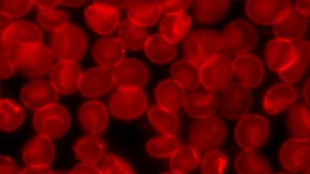 Red blood cellsWIKIMEDIA COMMONS, MDOUGM
Red blood cellsWIKIMEDIA COMMONS, MDOUGM
Scientists have crafted an injectable foam containing oxygen-carrying microparticles that could potentially be used to resuscitate patients undergoing severe oxygen deprivation. The team of researchers, most of whom work at Children's Hospital Boston, demonstrated that the microparticle solution could rapidly oxygenate the blood of rabbits struggling to breath in low oxygen conditions. They report their findings in the latest issue of Science Translational Medicine.
"This is a potential breakthrough," Peter Laussen, cardiac intensive care doctor at Children's Hospital Boston who was not involved in the work, told ScienceNOW. "You can apply this across healthcare, from the battlefield to the emergency room, intensive care unit, or operating room."
A body deprived of oxygen is a body in trouble. When major organs like the brain and heart ...













